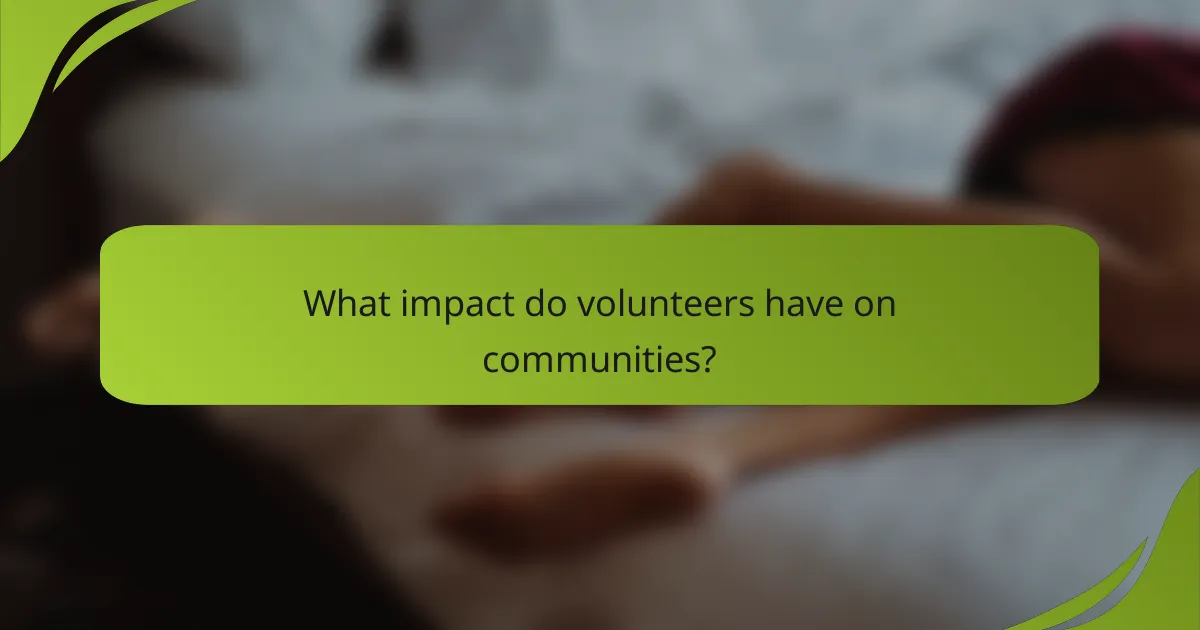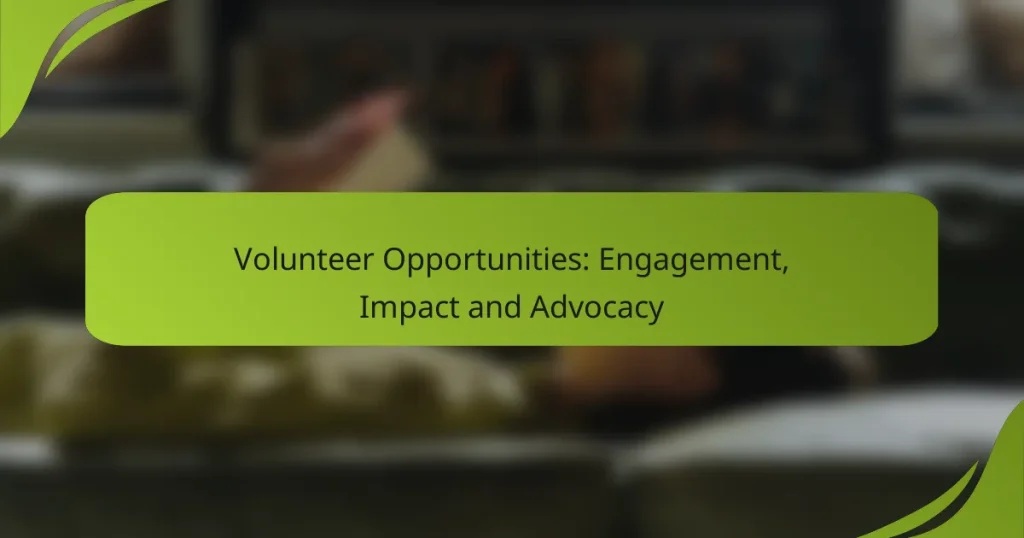Volunteering offers a unique opportunity to engage with your community while making a meaningful impact. With diverse options available across various sectors, individuals can find roles that align with their interests and skills, from nonprofit work to healthcare initiatives. By participating in local programs, volunteers not only address pressing community needs but also foster connections that drive social change and enhance overall well-being.

What are the best volunteer opportunities in the United States?
The best volunteer opportunities in the United States span various sectors, allowing individuals to engage in meaningful work that benefits communities. From nonprofit organizations to healthcare volunteering, these options cater to diverse interests and skills.
Nonprofit organizations
Nonprofit organizations are a primary avenue for volunteering, often focusing on social issues such as poverty, education, and animal welfare. Many nonprofits rely on volunteers for various roles, including administrative support, event planning, and direct service.
To find opportunities, consider local nonprofits or national organizations like Habitat for Humanity or the American Red Cross. Check their websites for volunteer applications and upcoming events.
Community service projects
Community service projects involve hands-on work that directly benefits local neighborhoods. These can include food drives, park clean-ups, and community gardens. Engaging in these projects fosters a sense of community and often attracts volunteers of all ages.
Look for initiatives organized by local governments or community centers. Participating in these projects can be a great way to meet people and make a tangible impact.
Environmental initiatives
Environmental initiatives focus on conservation and sustainability efforts. Volunteers can participate in activities such as tree planting, wildlife monitoring, and beach clean-ups. These opportunities are crucial for promoting ecological health and raising awareness about environmental issues.
Organizations like the Sierra Club and local conservation groups frequently host events. Joining these initiatives can be both rewarding and educational, helping volunteers understand environmental challenges.
Healthcare volunteering
Healthcare volunteering offers opportunities to support medical facilities, clinics, and health education programs. Volunteers may assist with administrative tasks, patient support, or community health outreach. This type of volunteering is particularly valuable in underserved areas.
Consider reaching out to hospitals, health departments, or organizations like the American Cancer Society for opportunities. Ensure you meet any requirements, such as background checks or specific training.
Educational programs
Educational programs provide volunteers the chance to support schools and youth organizations. Opportunities may include tutoring, mentoring, or leading workshops. These roles are vital for enhancing educational outcomes and fostering personal development among students.
Check with local schools, libraries, or organizations like Big Brothers Big Sisters to find suitable programs. Engaging in educational volunteering can be a fulfilling way to share knowledge and inspire the next generation.

How can I engage with local volunteer programs?
Engaging with local volunteer programs involves actively seeking opportunities to contribute your time and skills to community initiatives. This can enhance your connection to the community while making a positive impact.
Contact local nonprofits
Reaching out to local nonprofits is a direct way to discover volunteer opportunities. Many organizations rely on volunteers for various tasks, from administrative support to hands-on work in the field.
Start by researching nonprofits in your area that align with your interests, such as animal welfare, education, or environmental conservation. A simple phone call or email can open doors to available roles.
Join community boards
Joining community boards allows you to engage with local governance and advocacy efforts. These boards often seek volunteers to help shape policies and programs that benefit the community.
Look for openings in local government or community organizations. Participation can involve attending meetings, providing input on community needs, and collaborating with other members to drive initiatives forward.
Participate in volunteer fairs
Volunteer fairs are excellent venues to connect with multiple organizations in one place. These events typically showcase various local nonprofits and their volunteer needs, making it easier to find a suitable match.
Check local community centers or online event listings for upcoming fairs. Prepare by bringing questions and a resume, if applicable, to make a strong impression on potential organizations.

What impact do volunteers have on communities?
Volunteers play a crucial role in enhancing community well-being by addressing local needs, fostering connections, and driving social change. Their contributions can lead to significant improvements in social dynamics, local services, and awareness of pressing issues.
Improved social cohesion
Volunteering fosters stronger relationships among community members, creating a sense of belonging and mutual support. When individuals come together for a common cause, they build trust and understanding, which can lead to lasting friendships and networks.
For example, community clean-up events or food drives not only address immediate needs but also encourage collaboration, making neighborhoods more resilient and connected. Engaging diverse groups in volunteer activities can further enhance inclusivity and reduce social isolation.
Enhanced local services
Volunteers often supplement essential services that local governments or organizations may struggle to provide due to budget constraints. By offering their time and skills, volunteers can help improve the quality and reach of services such as education, healthcare, and public safety.
For instance, volunteers in schools can assist teachers, provide tutoring, or organize extracurricular activities, enriching the educational experience for students. Similarly, local health clinics may rely on volunteers for administrative support or outreach, allowing them to serve more patients effectively.
Increased awareness of issues
Volunteers help raise awareness about critical social issues by sharing their experiences and insights with the community. Their involvement often brings attention to problems that may otherwise go unnoticed, prompting discussions and action.
Campaigns led by volunteers, such as those focused on homelessness or environmental conservation, can mobilize community members and influence local policies. By participating in advocacy efforts, volunteers not only inform others but also empower them to take action, creating a ripple effect of awareness and engagement.

How can I advocate for volunteerism?
Advocating for volunteerism involves promoting the value of volunteering and encouraging others to participate. This can be achieved through storytelling, engaging with local authorities, and leveraging social media to raise awareness and support for volunteer initiatives.
Promote volunteer stories
Sharing personal stories from volunteers can significantly impact community engagement. Highlighting individual experiences showcases the benefits of volunteering, such as skill development, community connection, and personal fulfillment. Consider creating a dedicated section on your website or social media to feature these narratives.
Encourage volunteers to share their stories through interviews, blogs, or videos. This not only inspires others but also builds a sense of community and recognition for those involved. Use platforms like local newsletters or community boards to amplify these stories.
Engage with local government
Connecting with local government officials can enhance support for volunteer programs. Attend town hall meetings or community forums to discuss the importance of volunteerism and propose initiatives that could benefit from public backing. Building relationships with decision-makers can lead to increased funding and resources for volunteer projects.
Consider organizing joint events with local authorities to promote volunteer opportunities. This collaboration can raise awareness and demonstrate the community’s commitment to service, making it easier to secure ongoing support from government entities.
Utilize social media platforms
Social media is a powerful tool for advocating volunteerism. Use platforms like Facebook, Instagram, and Twitter to share updates, success stories, and upcoming volunteer opportunities. Engaging content, such as images and videos, can attract more attention and encourage participation.
Establish a consistent posting schedule and interact with followers to build a community around volunteering. Utilize hashtags related to your cause to reach a broader audience and encourage others to share their volunteer experiences. Consider running campaigns or challenges that promote volunteering and incentivize participation.

What skills can I gain from volunteering?
Volunteering offers a variety of skills that can enhance personal and professional development. Participants often gain valuable experience in leadership, networking, and project management, which can be beneficial in many career paths.
Leadership experience
Volunteering frequently provides opportunities to take on leadership roles, whether by managing a team or leading a specific project. This experience can help develop decision-making skills, confidence, and the ability to motivate others.
To maximize leadership growth, seek out roles that challenge you, such as coordinating events or mentoring new volunteers. These positions allow you to practice guiding others while honing your own leadership style.
Networking opportunities
Engaging in volunteer work connects you with a diverse group of individuals, including professionals from various fields. This networking can lead to valuable relationships, mentorships, and even job opportunities.
To make the most of these connections, attend events, engage in discussions, and follow up with contacts after volunteering. Building a strong network can enhance your career prospects and open doors to new opportunities.
Project management skills
Volunteering often involves planning and executing projects, which can improve your project management abilities. You may learn to set goals, allocate resources, and manage timelines effectively.
Consider volunteering for roles that require you to oversee specific initiatives, such as organizing community events or fundraising campaigns. These experiences will help you develop practical skills in managing projects from start to finish.

What are the prerequisites for effective volunteering?
Effective volunteering requires a clear understanding of your skills, interests, and the needs of the organization you wish to support. Additionally, being prepared to commit time and energy is essential for making a meaningful impact.
Time commitment
Time commitment is a crucial aspect of effective volunteering. It involves assessing how much time you can realistically dedicate to a cause without overwhelming your personal or professional life.
Consider the type of volunteering you are interested in. Some roles may require a few hours a week, while others could demand a more intensive commitment, such as several days a month. For instance, short-term projects may need only a few hours, whereas ongoing roles might expect a commitment of several months.
To avoid burnout, set clear boundaries regarding your availability. Make a list of potential volunteering opportunities and their time requirements to find a match that fits your schedule. Remember, consistent engagement, even if limited, can lead to significant contributions over time.


